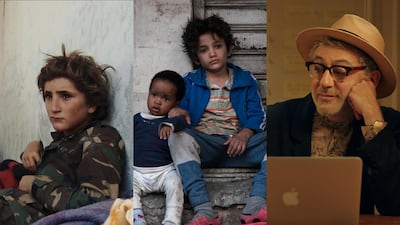By the end of the recent British Independent Film Awards, one thing was very clear: 2019 had been a stellar year for Arab cinema. For Sama took Best British Independent Film, becoming the first documentary to win the ceremony's top prize. A harrowing but hopeful first-person account of the Syrian civil war, it not only won Best Film, but also Best Director – for co-directors Edward Watts and Waad Al-Kateab, whose story this was – as well as Best Documentary and Best Editing.
Al-Kateab shot the film hand-held across several years, partly as a message to her young daughter, Sama, who was born during the uprising in Aleppo. "I know that most of the people here haven't seen the film … the first thing, go and watch it," she said, as she took to the stage for the final time. After this triumph, people undoubtedly will. For Sama must now surely be considered a major contender for the Best Documentary prize at the Oscars in February.
You might say this glorious year in Arab cinema began 10 months ago, at this year's Academy Awards, when Rami Malek won the Best Actor Oscar for his extraordinary portrayal of Queen singer Freddie Mercury in the hit biopic Bohemian Rhapsody. Malek, who was born in America to Egyptian immigrant parents, is arguably the most prominent actor with Egyptian roots since the great Omar Sharif. In April, he will be seen as the villain in new James Bond film No Time To Die.
Malek's win came alongside two other impressive Arab film nominations. In the Best Documentary category, there was a nod for Of Fathers and Sons, an eye-opening study by filmmaker Talal Derki, as he returned to his native Syria and encountered Abu Osama, a founder of the Al Qaeda-affiliated Al Nusra Front, whose extremist beliefs result in him sending his two sons to terrorist training camps. While the film lost out to Elizabeth Chai Vasarhelyi and Jimmy Chin's rock climbing documentary Free Solo, the nomination was a huge achievement.
The same can be said for Lebanese director Nadine Labaki's Capernaum. Its appearance at the Oscars in the Best Foreign Language Film category (following nods at the Golden Globes and the Baftas) marked the end of a remarkable journey for the movie, which began with its world premiere at Cannes last year, where it won the Jury Prize. The heartbreaking tale of a runaway child in the slums of Beirut confirmed Labaki as a storyteller of the highest order, the film a potent blend of naturalism and melodrama.
More significantly, Capernaum became the highest-grossing Middle Eastern film of all time, taking more than $68 million (Dh315.8m) worldwide – the bulk of which came from the Chinese market, where it took a staggering and entirely unexpected $54 million. Clever marketing by local distributor Road Pictures helped, as did word of mouth, which turned it into a phenomenon, outperforming even the likes of big American pictures such as Dumbo and Shazam!
This year in Cannes, Labaki returned to become the first Arab president on the Un Certain Regard jury.
More importantly, the festival itself – if not quite boasting a film of Capernaum's power – was still richly laden with Arab films. Palestinian filmmaker Elia Suleiman won the Cannes Special Jury Prize for This Must Be Heaven. In Un Certain Regard, Moroccan director Maryam Touzani premiered Adam, a tale set around a bakery in Casablanca; Algerian filmmaker Mounia Meddour also unveiled Papicha, a female-driven story set during the Algerian Civil War. Two other debut films – Abou Leila by Algerian director Amin Sidi-Boumediene, and The Unknown Saint by Moroccan director Alaa Eddine Aljem – also featured in Critics' Week.
What's clear from all this is the potential Arab cinema now has in reaching the rest of the world. Interest from international markets, such as China, is stirring, while voices are being heard and – impressively – many of those are female. Aside from Al-Kateab and Labaki, this year also marked the return of Haifaa Al-Mansour, the Saudi Arabian director behind 2012 film Wadjda. Her latest movie, The Perfect Candidate, became one of just two films directed by women to premiere at this year's Venice Film Festival. The story of a female doctor, played by Mila Alzahrani, who decides to run for local office, much to the consternation of men in her community, it was yet another groundbreaking movie, exploring the evolution of the traditionally conservative Saudi Arabian society. While the script was vetted by Saudi authorities, it did not endure any roadblocks. "I thought maybe there would be notes on the script, but I didn't get any notes," Al-Mansour told me in Venice earlier this year.
This suggests a new-found narrative freedom. Her film was also supported by the newly formed Saudi Film Council, and it is initiatives such as this that have helped get young directors from the region out into the world. Talking to Al-Mansour for The National, she spoke about the importance of "empowering young Saudi filmmakers and giving them a chance to grow", a sentiment that should be echoed across every country in the region.
Also playing in Venice this year was Arab Blues, a new comedy set in Tunisia by Manele Labidi and starring the Iranian actress Golshifteh Farahani as a psychoanalyst who returns from France to open up her own practice. While Farahani doesn't have the profile of Rami Malek yet, she is certainly on the rise – having just wrapped Dhaka, a thriller co-starring Avengers actor Chris Hemsworth.
Another heartening development is the rise of Arab genre cinema, one that signals a move away from the traditions of social realism. Talal Selhami's Achoura, Morocco's first fantasy film, won the Special Jury Prize at this year's Sitges Fantastic Film Festival, a mainstay of the genre circuit. It's the start of another intriguing path open to local filmmakers. As 2020 nears, the overriding feeling is one of optimism and promise for Arab cinema.

